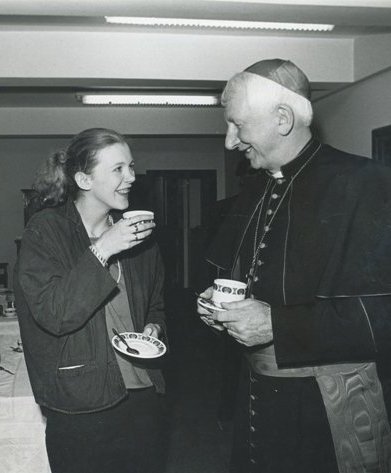For this month’s edition of the Westminster Record, we sent Chris O’Callaghan to the Cardinal Hume Centre in Victoria to see how its Gateway advice service goes and to spend a morning on the front line of the Centre’s work.
Although best known for its work with homeless young people, the Cardinal Hume Centre provides a range of services that benefit so many people. To see just one small part of this, I spent a morning shadowing staff in the Gateway advice service office, a growing arm of the Centre.
The exterior of the Centre may look small and unimpressive but its interior is a labyrinth of rooms and corridors which Chief Executive Cathy Corcoran describes as ‘like a Tardis’ because it is bigger on the inside. Tucked away on the ground floor is the Gateway advice service - comprising of a reception area, an office and a series of small consultation rooms, it is from here that all their good work is done.
For many, the Gateway is their first point of contact at the Centre. It provides assessment and advice for a variety of issues: housing, immigration, benefits, homelessness. Around 140 new clients are seen each week, each in unique circumstances. Cathy said it showed how severe the government cuts and welfare reforms have been that so many people are new each week. From first assessment, clients can be referred to services within the Centre or to local organisations better able to provide help and expertise.
As the morning progressed, I saw the staff manage a variety of issues, such as a woman needing to claim her husband’s disability benefit, a Spanish lady signing up to a college course and a lady applying for housing. In the Jobs Club in the IT room, they see twenty people a week but sometimes there is a queue outside their door of people waiting for Internet access and the Centre’s support.
I asked Phil Reynolds, the Gateway Duty Officer what it was like working there. ‘There are more good days than bad ones – if it was all bad, none of us would ever want to come in. We never know what is going to come through the door day-to-day so that element of the unknown makes it interesting’. The hardest thing about working at the Centre? ‘Saying no to people’.
Lucy Harding explained to me that sometimes people expect the Centre will be able to put them into a flat immediately and when they realise they cannot provide that kind of service, it can be very disheartening and tears are not uncommon. ‘We can’t magic up homes or jobs for everyone, but we can give advice and make sure people get the help that they are entitled to’, Cathy observed. But ‘sometimes the most honest and painful advice is hard to hear but in some cases, we have to say it’, Phil added. Including advising some migrants to return to their native country? ‘As a last resort, sometimes that is all we can say’.
I had seen Spaniards, Iranians and some African people and wondered if this was typical of their normal clientele. To my surprise, both Phil and Lucy agreed that most were from Eritrea, a small African country which has had a turbulent recent history with Ethiopia.
Equally a lot of Spanish migrants have come over here since the downturn. Spain was hit especially hard by the global financial crisis with general unemployment as high as 26% earlier this year. ‘Whereas before we saw Spanish students who wanted to extend their visas in the UK, we now see people in their 40s who have come over here to work and send money back to their young families’.
Gateway are fighting an uphill battle in many cases, wading through government red tape and legislation to simply try and help people. And as they are the first point of contact, they rarely see the end result of a client’s journey after they are referred elsewhere. It would be hard not to respect the work done there.
Thinking this, I saw a note above Phil’s computer on a piece of A4 from a former client of his who was desperate to see a show in the National Theatre about homelessness. Phil was able to get a ticket through one of the Centre’s partners and this note was a thank you. But not just one. I counted fifty-one separate ‘thank yous’ on the paper. ‘It’s nice to get recognition for the little things we can do for people’, he said as a small smile of satisfaction came across his face. There was his inspiration. Knowing that a small gesture like that can bring someone joy shows what a difference the workers in the Gateway make to people’s lives. Long may they continue to fight the good fight and as the Centre’s motto reads, ‘turn lives around’.
By Chris O'Callaghan




